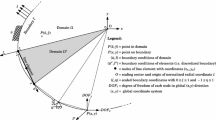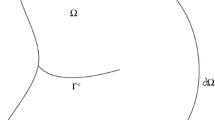Abstract
Classical approaches to inverse reliability analysis, and to reliability-based design optimization, require evaluation of limit state gradients. This can be an issue for highly non-linear time-variant reliability problems. Stochastic fracture mechanics, for instance, involves non-linear crack propagation and millions of load cycles; also hundreds to millions of random variables. Gradient computation becomes highly unstable at the end of fatigue life, as does the crack growth process. In this paper, a hybrid approach is proposed for solving this type of problem: it explores and combines the best of Monte Carlo Simulation (MCS), First-Order Reliability Method (FORM) and a root-finding method. The non-linear crack propagation phase of the problem is handled by MCS; the final fracture problem is handled by FORM; and the allowable crack size, required to impose a minimum lifetime reliability, is obtained by simple root-finding, among the set of initial crack size samples. Efficiency is achieved: (a) by classifying initial crack size samples, and computing only those terms effectively contributing non-zero probabilities to the integral; and (b) by solving the optimization problem using the information acquired from a single Monte Carlo run. The proposed hybrid approach is employed in the solution of typical crack propagation problems: it is shown that it gains efficiency when the target reliability and the number of load cycles are large, as expected in practical problems of this kind. It is also shown that it converges to the reference solutions, being them exact, when available, or usual MC-based solutions, while taking only a fraction of the computational time required by the latter.













Similar content being viewed by others
References
American Petroleum Institute, Fitness-for-Service, API 579-1/ASME FFS-1, 2016.
Anderson TL (2005) Fracture mechanics: fundamentals and applications, 3rd edn. Taylor & Francis Group, Boca Raton
Aoues Y, Chateauneuf A (2010) Benchmark study of numerical methods for reliability-based design optimization. Struct Multidisc Optim 41:277–294. https://doi.org/10.1007/s00158-009-0412-2
Arora JS (2012) Introduction to optimum design, 3rd edn. Elsevier, Oxford
Au S-K, Beck JL (2001) Estimation of small failure probabilities in high dimensions by subset simulation. Probab Eng Mech 16(4):263–277. https://doi.org/10.1016/S0266-8920(01)00019-4
Balu AS, Rao BN (2012) Inverse structural reliability analysis under mixed uncertainties using high dimensional model representation and fast Fourier transform. Eng Struct 37:224–234. https://doi.org/10.1016/j.engstruct.2011.12.043
Beck AT, Gomes WJS, Lopez RH, Miguel LFF (2015) A comparison between robust and risk-based optimization under uncertainty. Struct Multidisc Optim 52:479–492. https://doi.org/10.1007/s00158-015-1253-9
Beck AT, Gomes WJS (2012) A comparison of deterministic, reliability-based and risk-based structural optimization under uncertainty. Probab Eng Mech 28:18–29. https://doi.org/10.1016/j.probengmech.2011.08.007
Beck AT, Melchers RE (2004) Overload failure of structural components under random crack propagation and loading: a random process approach. Struct Saf 26:471–488
Beck AT, Silva Jr CRA (2016) Strategies for finding the design point under bounded random variables. Struct Saf 58:79–93. https://doi.org/10.1016/j.strusafe.2015.08.006
Berens A, Hovey P (1981) Evaluation of NDE reliability characterization. Report no AFWAL-TR-81-4160, vol. 1. University of Dayton Research Institute
Brent RP (1973) Algorithms for minimization without derivatives. Prentice-Hall, Englewood Cliffs
British Standard Institution, Guide to methods for assessing the acceptability of flaws in metallic structures, BS-7910, 2019
Carpinteri A (1994) Handbook of fatigue crack: propagation in metallic structures. Elsevier, Amsterdam
Cheng J, Li QS (2009) Application of the response surface methods to solve inverse reliability problems with implicit response functions. Comput Mech 43:451–459. https://doi.org/10.1007/s00466-008-0320-0
Cheng J, Zhang J, Cai CS, Xiao R-C (2007) A new approach for solving inverse reliability problems with implicit response functions. Eng Struct 29:71–79. https://doi.org/10.1016/j.engstruct.2006.04.005
Der Kiureghian A, Zhang Y, Li CC (1994) Inverse Reliability Problem. J Eng Mech 120(5):1154–1159. https://doi.org/10.1061/(ASCE)0733-9399(1994)120:5(1154)
Ditlevsen O, Madsen HO (2007) Structural reliability methods. Technical University of Denmark
Du W, Luo Y, Wang Y (2019) A time-variant performance measure approach for dynamic reliability based design optimization. Appl Math Model 76:71–86. https://doi.org/10.1016/j.apm.2019.06.004
Du X, Hu Z (2012) First order reliability method with truncated random variables. J Mech Des 134:091005. https://doi.org/10.1115/1.4007150
Eamon C, Charumas B (2011) Reliability estimation of complex numerical problems using modified conditional expectation method. Comput Struct 446(89):181–188. https://doi.org/10.1016/j.compstruc.2010.09.002
Engelund S, Rackwitz R (1993) A benchmark study on importance sampling techniques in structural reliability. Struct Saf 12:255–276. https://doi.org/10.1016/0167-4730(93)90056-7
Forsythe GE, Malcolm MA, Moler CB (1976) Computer methods for mathematical computations. Prentice Hall, Englewood Cliffs
Frangopol DM (1985) Multicriteria reliability-based structural optimization. Struct Saf 3(1):23–28. https://doi.org/10.1016/0167-4730(85)90004-9
Garmbis AG (2017) A probabilistic approach for EOL fracture analysis of subsea pipelines. In: Proceedings of the Rio Pipeline Conference & Exhibition, Rio de Janeiro.
Giske F-IG, Leira BJ, Øiseth O (2017) Full long-term extreme response analysis of marine structures using inverse FORM. Probab Eng Mech 50:1–8. https://doi.org/10.1016/j.probengmech.2017.10.007
Gomes WJS, Beck AT (2014) Optimal inspection planning and repair under random crack propagation. Eng Struct 69:285–296. https://doi.org/10.1016/j.engstruct.2014.03.021
Guedes SC (1997) Quantification of model uncertainty in structural reliability. In: Guedes SC (ed) Probabilistic methods for structural design. Springer, Dordrecht, pp 17–37
Hao P, Ma R, Wang Y, Feng S, Wang B, Li G, Xing H, Yang F (2019) An augmented step size adjustment method for the performance measure approach: toward general structural reliability-based design optimization. Struct Saf 80:32–45. https://doi.org/10.1016/j.strusafe.2019.04.001
Jiang C, Fang T, Wang ZX, Wei XP, Huang ZL (2017) A general solution framework for time-variant reliability based design optimization. Comput Methods Appl Mech Eng 323:330–352. https://doi.org/10.1016/j.cma.2017.04.029
Keshtegar B, Lee I (2016) Relaxed performance measure approach for reliability-based design optimization. Struct Multidisc Optim 54:1439–1454. https://doi.org/10.1007/s00158-016-1561-8
Keshtegar B (2017) A hybrid conjugate finite-step length method for robust and efficient reliability analysis. Appl Math Model 45:226–237. https://doi.org/10.1016/j.apm.2016.12.027
Kharmanda G, Sayegh MA (2020) Reliability-based design optimization for heat flux analysis of composite modular walls using inverse reliability assessment method. Int J Thermofluids 1–2:100008. https://doi.org/10.1016/j.ijft.2019.100008
Kroetz HM, Moustapha M, Beck AT, Sudret B (2020) A two-level kriging-based approach with active learning for solving time-variant risk optimization problems. Reliab Eng Syst Saf 203:107033. https://doi.org/10.1016/j.ress.2020.107033
Lehký D, Novák D (2012) Solving inverse structural reliability problem using artificial neural networks and small-sample simulation. Adv Struct Eng 15(11):1911–1920. https://doi.org/10.1260/1369-4332.15.11.1911
Li FZ, Low YM (2012) Fatigue reliability analysis of a steel catenary riser at the touchdown point incorporating soil model uncertainties. Appl Ocean Res 38:100–110. https://doi.org/10.1016/j.apor.2012.07.005
Li H, Foschi RO (1998) An inverse reliability method and its application. Struct Saf 20:257–270. https://doi.org/10.1016/S0167-4730(98)00010-1
Li J, Chen J (2019) Solving time-variant reliability-based design optimization by PSO-t-IRS: a methodology incorporating a particle swarm optimization algorithm and an enhanced instantaneous response surface. Reliab Eng Syst Saf 191:106580. https://doi.org/10.1016/j.ress.2019.106580
Lopez RH, Beck AT (2012) Reliability-based design optimization strategies based on FORM: a review. J Braz Soc Mech Sci Eng 34(4):506–514. https://doi.org/10.1590/S1678-58782012000400012
Luo Y, Li A, Kang Z (2011) Reliability-based design optimization of adhesive bonded steel–concrete composite beams with probabilistic and non-probabilistic uncertainties. Eng Struct 33(7):2110–2119. https://doi.org/10.1016/j.engstruct.2011.02.040
Madsen HO (1997) Stochastic modeling of fatigue crack growth and inspection. In: Guedes SC (ed) Probabilistic methods for structural design. Springer, Dordrecht, pp 59–83
Maes MA, Breitung K, Dupuis DJ (1993) Asymptotic importance sampling. Struct Saf 12:167–186. https://doi.org/10.1016/0167-4730(93)90001-H
Maes MA (1996) Ignorance factors using model expansion. J Eng Mech 122(1):39–45. https://doi.org/10.1061/(ASCE)0733-9399(1996)122:1(39)
Mechab B, Serier B, Bachir Bouiadjra B, Kaddouri K, Feaugas X (2011) Linear and non-linear analyses for semi-elliptical surface cracks in pipes under bending. Int J Press Vessels Pip 88(1):57–63. https://doi.org/10.1016/j.ijpvp.2010.11.001
Melchers RE, Beck AT (2018) Structural reliability analysis and prediction, 3rd edn. Wiley, New York
Meng Z, Li G, Wang BP, Hao P (2015) A hybrid chaos control approach of the performance measure functions for reliability-based design optimization. Comput Struct 146:32–43. https://doi.org/10.1016/j.compstruc.2014.08.011
Meng Z, Li G, Yang D, Zhan L (2017) A new directional stability transformation method of chaos control for first order reliability analysis. Struct Multidisc Optim 55:601–612. https://doi.org/10.1007/s00158-016-1525-z
Min X, Dueñas-Osorio L (2009) Inverse reliability-based design of interdependent lifeline systems. In: Proceedings of the technical council on lifeline earthquake engineering conference (TCLEE) 2009, California. Doi:https://doi.org/10.1061/41050(357)60
Mínguez R, Castillo E, Hadi AS (2005) Solving the inverse reliability problem using decomposition techniques. Struct Saf 27:1–23. https://doi.org/10.1016/j.strusafe.2004.04.001
Moustapha M, Sudret B (2019) Surrogate-assisted reliability-based design optimization: a survey and a unified modular framework. Struct Multidisc Optim 60:2157–2176. https://doi.org/10.1007/s00158-019-02290-y
Newman JC Jr, Raju IS (1981) An empirical stress-intensity factor equation for the surface crack. Eng Fracture Mech 15(1–2):185–192. https://doi.org/10.1016/0013-7944(81)90116-8
Paris PC, Erdogan F (1963) A critical analysis of crack propagation laws. J Basic Eng 85(4):528–534. https://doi.org/10.1115/1.3656900
Petruska D, Ku A, Masson C, Cook H, McDonald W, Spong R (2006) Calculation of reliability-based safety factors for establishing defect acceptance criteria for Deepwater riser welds. In: Proceedings of the deep offshore technology (DOT) Conference 2006, Houston
Predan J, Mocilnik V, Gubeljak N (2013) Stress-intensity factors for circumferential semi-elliptical surface cracks in a hollow cylinder subjected to pure torsion. Eng Fract Mech 105:152–168. https://doi.org/10.1016/j.engfracmech.2013.03.033
Raju IS, Newman Jr JC (1985) Stress-intensity factor for circumferential surface cracks in pipes and rods under tension and bending loads. NASA Technical Memorandum 87594
Ramesh RB, Mirza O, Kang W-H (2017) HLRF-BFGS-based algorithm for inverse reliability analysis. Math Probl Eng 2017:4317670. https://doi.org/10.1155/2017/4317670
Sadovsky Z (2000) Discussion on: an inverse reliability method and its application. Struct Saf 22:97–102. https://doi.org/10.1016/S0167-4730(99)00039-9
Schijve J (2009) Fatigue of structures and materials, 2nd edn. Springer, Dordrecht
Schueller GI, Freudenthal AM (1972) Scatter Factor and Reliability of Aircraft Structures. National Aeronautics and Space Administration, Washington DC, Report NASA CR-2100.
Sherali HD, Ganesan V (2007) An Inverse Reliability-based approach for designing under uncertainty with application to robust piston design. J Glob Optim 37:47–62. https://doi.org/10.1007/s10898-006-9035-y
Shi Y, Lu Z, Huang Z, Xu L, He R (2020) Advanced solution strategies for time-dependent reliability based design optimization. Comput Methods Appl Mech Eng 364:112916. https://doi.org/10.1016/j.cma.2020.112916
Sobczyk K, Spencer BF (1992) Random fatigue: from data to theory. Academic Press, London
Stoer J, Bulirsch R (1993) Introduction to numerical analysis, 2nd edn. Springer, New York
Torii AJ, Lopez RH, Miguel LFF (2019) A second order SAP algorithm for risk and reliability based design optimization. Reliab Eng Syst Saf 190:106499. https://doi.org/10.1016/j.ress.2019.106499
Tu J, Choi KK, Park YH (1999) A new study on reliability-based design optimization. J Mech Des 121:557–564. https://doi.org/10.1115/1.2829499
Winterstein S, Ude TC, Cornell CA, Bjerager P, Haver S (1993) Environmental parameters for extreme response inverse FORM with omission sensitivity. In: Proceedings of international conference on structural safety and reliability, Innsbruck, ICOSSAR-93
Xiang Y, Liu Y (2011) Application of inverse first-order reliability method for probabilistic fatigue life prediction. Probab Eng Mech 26:148–156. https://doi.org/10.1016/j.probengmech.2010.11.001
Yaseen ZM, Keshtegar B (2019) Limited descent-based mean value method for inverse reliability analysis. Eng Comput 35:1237–1249. https://doi.org/10.1007/s00366-018-0661-z
Youn BD, Choi KK, Yang R-J, Gu L (2004) Reliability-based design optimization for crashworthiness of vehicle side impact. Struct Multidisc Optim 26:272–283. https://doi.org/10.1007/s00158-003-0345-0
Yu S, Wang Z (2019) A general decoupling approach for time- and space-variant system reliability-based design optimization. Comput Methods Appl Mech Eng. https://doi.org/10.1016/j.cma.2019.112608
Zhang Y, Der Kiureghian A (1995) Two improved algorithms for reliability analysis. In: Rackwitz R, Augusti G, Borri A (eds). Reliability and optimization of structural systems. IFIP—the international federation for information processing. Springer; Boston pp 297–304. Doi:https://doi.org/10.1007/978-0-387-34866-7_32
Acknowledgements
This work was sponsored by PETROBRAS through Cooperation Term 5900.0112628.19.9: “Innovation for acceptability of flaws in rigid risers using probabilistic fracture mechanics”. This work is also supported by the National Council for Technological and Scientific Development (CNPq) via grants 302489/2017-7 and 309107/2020-2.
Author information
Authors and Affiliations
Corresponding author
Ethics declarations
Conflict of interest
The authors declare no conflict of interest in conducting this research and submitting this manuscript for publication.
Replication of results
The MATLAB® files used to produce results in this paper will be made available by the corresponding author upon request.
Additional information
Responsible Editor: Yoojeong Noh
Publisher's Note
Springer Nature remains neutral with regard to jurisdictional claims in published maps and institutional affiliations.
Rights and permissions
About this article
Cite this article
Gomes, W.J.S., Garmbis, A.G. & Beck, A.T. Hybrid MCS-FORM approach to solve inverse fracture mechanics reliability problems. Struct Multidisc Optim 65, 77 (2022). https://doi.org/10.1007/s00158-022-03182-4
Received:
Revised:
Accepted:
Published:
DOI: https://doi.org/10.1007/s00158-022-03182-4




